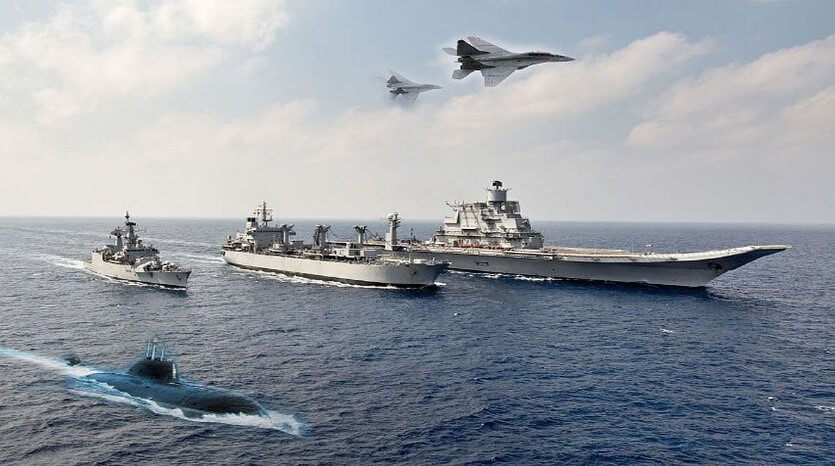
Decision Time Has Arrived For India
 Mon, 08 Nov 2021
| Reading Time: 6 minutes
Mon, 08 Nov 2021
| Reading Time: 6 minutes

It was Regis Debray who wrote that “we are never contemporaneous with the present”, and that the past intrudes and succeeds in diluting our understanding of the realities of the moment. This has long been witnessed in the Lutyens Zone, where policy prescriptions from a failed past get used over and over again, always leading to the same dismal result.
The world is now entering a phase as filled with the potential for disaster as was the situation in Europe once the 20th century dawned. Error upon error was made by rulers of significant European countries, mistakes that were based on the recommendations of policymakers whose minds were anchored in the world of the 19th century.
The Czar of the Russian Empire paid the highest price for such missteps, ending in the death of himself and his immediate family under terrible circumstances. History books portray Rasputin as an unlettered charlatan who had established dominance over the Czarina in particular. What is seldom mentioned is that Rasputin correctly identified the feudal nobility clustered around the court of the Emperor as the primary cause of the decline in the popularity of the Czar among the people, and urged that they be marginalised and contact be established directly between the Royal Court and the people, from whom Rasputin himself came. Prince Felix Youssuppov and other nobles assassinated him, and helped fuel the train of circumstances that led eventually to the takeover of Russia by the Bolshevik Party headed by Vladimir Illyich Lenin in 1917.
Shielded from information about the true state of morale and preparedness of the Russian military, Czar Nicholas declared war on Germany, thereby sealing the fate of both himself as well as Kaiser Wilhelm of Germany in the war that ensued between them.
The 1914-19 war made impossible the indefinite retention by European powers of their colonies in Asia in particular. This vulnerability was brought to breaking point by the 1939-45 conflict, caused by miscalculation about the intent of Adolf Hitler, who had managed to wrest control of Germany and was determined to repeat within Europe what several countries in that continent had done in Asia, Africa and South America, which is oppress the inhabitants of a country and drain it of its resources.
After seeing the way in which British, Dutch and French troops in particular folded before the Japanese, an Asian power, across multiple theatres in Asia, more and more men and women in the Royal Indian Army and Navy began to fight back. This fight back was against the notion that they would need to be perpetually inferior in rank and reward for the very same British officers and men who had been humiliated by the Japanese.
From the close of the 1939-45 war, it was apparent that the British would have to leave India, as they could no longer rely on Indians to keep other Indians in check. Mahatma Gandhi gave the British a face-saver through satyagraha, and that was used by Whitehall as the excuse why the Union Jack was replaced on Raisina Hill and elsewhere in (what was left of) India in 1947, an inevitability accepted even by the ternal imperialist Winston Spencer Churchill.
Storm clouds had been developing over the Peoples Republic pf China since the 1997 handover of power over Hong Kong to Beijing, again an inevitability that was not possible to resist or even delay on the British side. From that time onwards, the Chinese Communist Party began to regard as not just possible, not just likely, but certain the replacement of the US by China as the dominant world power. The ambience created by the Hong Kong handover gave the CCP leadership the confidence to begin planning and working towards the PRC becoming the centre of gravity of the international community. Although this ambition was kept away from even the view of the ordinary population of China in line with the command of Paramount Leader Deng Xiao-ping to “speak softly but carry a big stick”, a stick that grew bigger each year.
“Hide capabilities and bide your time”, was Deng’s prescription, and this was followed by his successors, Jiang Zemin and Hu Jintao. In 2012, the burnout of Bo Xilai and the lack of fightback of Li Keqiang and his supporters ensured that Xi Jinping, who believed in following in the path of not Deng as his two predecessors had but Mao Zedong, took over as CCP General Secretary.
From then on, moves to ensure the primacy of Beijing over Washington were made more and more openly, in order to make the rest of the world accept such a transition as an inevitability. From the start of its formation since 1921 the CCP had seen itself as the eventual rulers of China. Once Mao took control in the 1940s, the party saw itself as the masters of Greater China, and worked towards bringing Xinjiang, Inner Mongolia, Manchuria and Tibet under its control. Taiwan was regarded as low-hanging fruit that could be taken at any time, but being populated largely by Han settlers from the other side of the straits, the decision was to wrest the island by stealth, incrementally creating facts on the ground that would make control by Beijing inevitable.
The emergence of democracy in place of the Chiang Kai-shek autocracy after the rule of the Generalissimo’ss son Chiang Ching-kuo (1978-88) made that task more and more problematic. Once Xi Jinping took over as CCP General Secretary in 2012, the latent ambition nursed by Mao of once again making China the Middle Kingdom (the global centre of authority) resurfaced at speed, and by 2015, Xi began working to ensure that this becomes a reality while he remained at the helm.
The People’s Liberation Army was to be the primary instrument through which this would be accomplished. The first task was to establish primacy across the Eurasian continent, for which the Belt & Road Initiative (BRI) was launched across Eurasia. This was designed to give Beijing control over supply lanes in this vast tract of territory, an ambition further met through creating the Sino-Russian alliance, which may more accurately be described as the Putin-Xi alliance.
Next was to establish dominance over the South China Sea, and this began from the period (2003-2013) in office of Hu Jintao, especially during his second term. Once Xi took over as Party General Secretary in 2012 (with Hu retaining the empty title of President for a while longer), measures to establish dominance over the South China Sea accelerated, including by taking over territorial and sea space that belonged to South-east Asian countries, as well as the Philippines. While they are themselves vulnerable to kinetic attack by the four navies of the Quad, unchallenged by such assertiveness, the artificial islands and the structures put up in them have made the PRC a military power in waters where it previously had no kinetic presence.
If there is any single cause of the success of the PRC in the South China Sea, it is the pusillanimity exhibited by the US, which has shied away from any barring symbolic moves such as sending naval vessels into international waters claimed by China.
Taking over Taiwan in effect, if not immediately, formally would give a boost to establish a similar primacy over the East China Seas, which is why that is high among the priorities of the institution that has become Xi’s thinktank in external forays, the Central Military Commission that he has headed for nearly a decade and frequently consults.
Another is to ensure that the only potential challenger to the PRC’s march towards dominance in the Indian Ocean segment of the Indo-Pacific, India, be kneecapped and clearly shown to be vulnerable to China, as was done in 1962. The Lutyens Zone may not accept this, but a repeat of 1962 is among the primary objectives of the CMC, whatever the diplomats and other interlocuters from the PRC may claim to their counterparts in India.
It is not a question of whether, but when, a substantial kinetic assault across the Sino-Indian border will take place, and this is likely well within the present term of Prime Minister Narendra Modi. The calculation in Beijing is that such a military setback would severely weaken Modi’s popularity among the people of the country, show India up to the US as unable to be an effective security partner, eliminate efforts by the US and a few other powers to “balance” China by helping boost the capabilities of India, and ensure that a land grab take place as substantial as what is being witnessed from 1953 and continuing.
The PLA constantly seeks to nibble away at Indian territory along the border, thereby making it a necessity to station a substantial number of troops and other kinetic capability along the Line of Actual Control, to prevent such incremental expansionism. The only way out of such a situation is to ensure that a non-proportional kinetic response be given to such intrusions, to ensure the success of which coordination is needed with other Quad members, especially the US and Australia, as Japan is unlikely to venture into the South China Sea for some time. Those with confidence in Prime Minister Narendra Modi believe that such efforts must already be ongoing.
The CMC tactic of expansion by a thousand intrusions can only be reversed by a confrontation that educates the PLA that India is not a country they can avoid defeat from. Despite the hesitations of the Lutyens Zone, the country has to plan and execute a kinetic operation that will end badly for the PLA and remove its illusions about being able to get the better of what it believes is still (unlike Taiwan) an isolated India.
A state of growing and permanent mobilisation across the Line of Actual Control would drain attention and resources away from efforts at sparking the double-digit growth needed in India to ensure that the country’s demography result in a substantial dividend, rather than in massive youth unemployment.
What needs to be avoided are policy errors caused by remaining tethered to ways of thought and action that have long ceased to be relevant to the realities of the present. This is a period that can lead to either great success or its reverse, because of the policies followed.
****************
Disclaimer
The opinions expressed in this article are the author’s own and do not reflect the views of Chanakya Forum. All information provided in this article including timeliness, completeness, accuracy, suitability or validity of information referenced therein, is the sole responsibility of the author. www.chanakyaforum.com does not assume any responsibility for the same.
Chanakya Forum is now on . Click here to join our channel (@ChanakyaForum) and stay updated with the latest headlines and articles.
Important
We work round the clock to bring you the finest articles and updates from around the world. There is a team that works tirelessly to ensure that you have a seamless reading experience. But all this costs money. Please support us so that we keep doing what we do best. Happy Reading
Support Us





















POST COMMENTS (3)
Kalidan Singh
Pradeep Pushkar
aasheesh